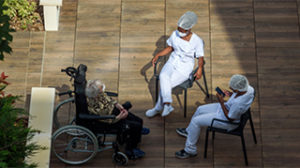
Making Care Work Pay
A blog in Health Affairs summarizes LeadingAge and LTSS Center research showing that raising the pay of direct care workers by 15% would provide concrete benefits for a variety of stakeholders. The authors recommend 3 ways to support efforts to pay direct care workers at least a living wage: target Medicaid reimbursement rates to wages, reform the LTSS financing system; and professionalize the direct care workforce.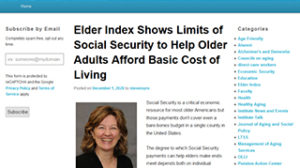
Limits of Social Security In Helping Older Adults Afford Cost Of Living
More than half of adults age 65 or older are believed to rely on Social Security for at least 50% of their family income. Nearly a quarter depend on that benefit for 90% or more of their income. But a report from UMass Boston found that, on average, Social Security payments covered only 69.7% of the basic cost of living for an older single renter in good health across the United States. The remaining uncovered annual expenses amounted to $7,850.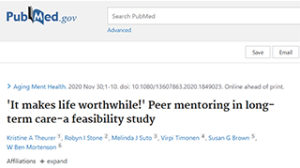
Peer Mentoring in Long-Term Care
A study published in Aging and Mental Health suggests that mentorship could be a viable approach to reducing loneliness and depression in long-term care settings. Researchers evaluated the Java Mentorship program, through which teams of community volunteers and resident volunteer mentors visited and guided socially disengaged nursing home residents. They found that residents enjoyed and benefitted from their role as mentors, despite significant physical and cognitive challenges.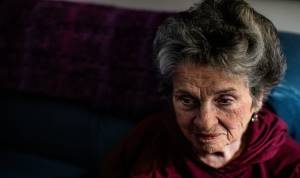
Where Will All The Geriatricians Come From?
The federal government estimates that 1 geriatrician can care for 700 patients with complicated medical needs. That means we’ll need 33,200 geriatricians by 2025 to fill the need for care among older Americans. We now have about 7,000 geriatricians, and only half of them practice full time. Paula Span reports in her recent New York Times column that few medical residents decide to specialize in geriatrics because geriatricians earn a fraction of what anesthesiologists, radiologists, and cardiologists earn. Plus, the field of geriatrics doesn’t have the “glamour or the prospect of medical heroics.” Confusing the picture is a 2009 survey finding that “geriatricians reported higher career satisfaction than most.”
When Refugees Enter The Workforce
Despite the harrowing circumstances that force refugees to flee their countries, “they come with a range of skills and talents that they simply want to put to use in building a new life for themselves,” writes Adi Gaskell in Forbes. But, too often, those refugees face barriers that prevent them from doing just that. Gaskell cites research suggesting ways that countries can help refugees become meaningful members of their communities. For example, a Stanford University study found that some refugees had a higher chance than other refugees of settling in their home country, due to factors like education level, knowledge of English, and the location where they settled.
Aging In America: A Book Review
Elderhood, a new book by Louise Aronson, “breathed new life into my somewhat jaded view of the current landscape and potential future of aging in America,” writes Robyn Stone in a recent book review published in Health Affairs. Aronson makes a compelling case for “recognizing elderhood as a unique stage of life with all of its positive and negative dimensions,” writes Stone. Specifically, Aronson calls for the recruitment and training of physicians and other health care professionals to deal with each stage of the life course: pediatricians for childhood, internists for adulthood, and geriatricians for elderhood.
How Is Aging Like Climate Change?
Author Susan Jacoby used a recent column in The New York Times to suggest that our attitudes about aging are a lot like our attitudes about climate change. “Like climate change, the aging of America demands serious reconsideration of the way we live,” she writes. “Confronting the issue and its many implications … requires what seems to be the most difficult task for human beings—thinking about the future.”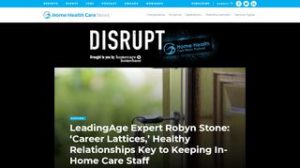
How To Retain Home Care Staff
“Next to family members, in-home care workers are the primary, hands-on providers of care, particularly long-term services and supports (LTSS), to older adults and people with disabilities or chronic conditions—in the United States and across the world.” That’s how Robyn Stone, co-director of the LTSS Center, began her recent 30-minute conversation with Home Health Care News for its “Disrupt” podcast.